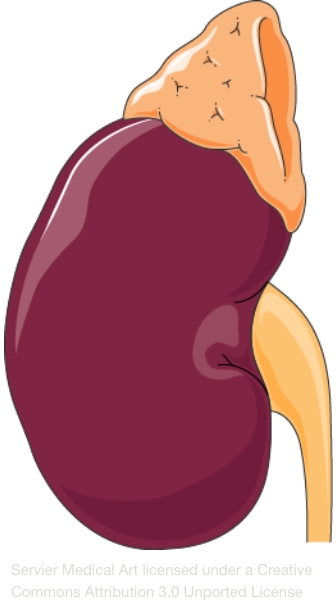Adrenal gland masses and tumours
What are adrenal masses and tumours?
The adrenal gland is a small gland which sits at the top of each kidney. It produces adrenaline and steroid hormones which help control your heart rate, blood pressure, and other important bodily functions.
Adrenal masses and benign tumours are relatively common (affecting an estimated 3–9% of people), though adrenal cancers are quite rare and affect less than 6 out of every 100,000 Australians annually. If diagnosed before they spread outside the adrenal gland, up to 74% of people diagnosed will live for five or more years afterward.

Symptoms of an adrenal mass/tumour
Many adrenal masses and tumours – particularly benign ones – do not produce symptoms at all, especially in the early stages. As the tumour develops, it may produce the following symptoms:
- Abdominal and/or back pain
- A lump in the abdomen
- A full feeling in the abdomen
- Hormonal changes
- Cushing’s syndrome (if your adrenal tumour secretes too much cortisol)
- Conn’s syndrome (if your adrenal tumour secretes too much aldosterone)
Remember that your own experience with adrenal cancers is individual – you may not experience every symptom and may experience slightly different symptoms to those specified. For further advice and diagnosis, book an appointment at Sandhurt Urology.
Diagnosing adrenal masses
After taking your medical history and conducting a physical exam for lumps in your abdomen, your doctor at Sandhurst Urology will generally diagnose an adrenal mass/tumour using a CT or MRI scan. These tests let them physically see the mass and assess which parts of your adrenal glands it may affect.
A urine test, metabolic workup or blood chemistry test may then be requested. This checks your blood’s level of sugar, proteins, chemicals, hormones, and other changes which could indicate an adrenal gland problem.
Preventing adrenal masses and tumours
Limited evidence suggests that obesity and tobacco use may increase your chances of developing an adrenal tumour, so avoiding smoking and managing your weight may help prevent them. However, there is no reliable method of preventing adrenal masses and tumours altogether. This is largely due to most influencing factors being genetic.
If you have a condition such as Li-Fraumeni syndrome, Carney complex, neurofibromatosis type 1, or multiple endocrine neoplasia type 1 or 2, your doctor may recommend regular scans or blood tests to monitor your glands. While they will not prevent adrenal tumours and masses, they may identify them in early stages and increase your likelihood of a successful recovery.

Treatments for adrenal masses
Nonsurgical treatments for adrenal masses are usually focussed around preventing the disease from spreading and maintaining normal adrenal functions where possible. Techniques used may include the following:
- Watchful waiting – most benign adrenal tumours do not require medical intervention. Instead, your doctor at Sandhurst Urology may recommend regular scans or blood tests to ensure it doesn’t become cancerous and catch it early if it does.
- Hormone regulating medications – since adrenal tumours can cause excess hormone production, your urologist might prescribe medications that improve your comfort by regulating your hormone levels. You may also receive a referral to an endocrinologist or other hormone specialist for ongoing management.
Medical interventions for adrenal masses
Most functional adrenal tumours (tumours which produce hormones) are treated with surgery. When this happens, the surgery’s goal is usually to remove as much of the tumour as possible to prevent it spreading or further impacting your health. Procedures used to do this can include:
- Adrenalectomy – a surgery which involves removing the affected adrenal gland in its entirety. After the procedure, you may need to take cortisol replacement medications for a while until your remaining adrenal gland starts to produce enough hormones.
- Nephrectomy – in rare cases, your surgeon may believe it is safer to remove your entire affected kidney, rather than just the adrenal gland. This may happen if your adrenal tumour has spread into your kidney.
Note that Sandhurst Urology is currently Bendigo’s only provider of laparoscopic adrenalectomy. Dr Rohan Hall has undergone additional training to provide this service – to have your suitability for it assessed, ask your GP for a referral to Sandhurst Urology or contact our practice.
Providing Excellent Urological Care of the Highest Standards
Book a consultation with Sandhurst Urology today